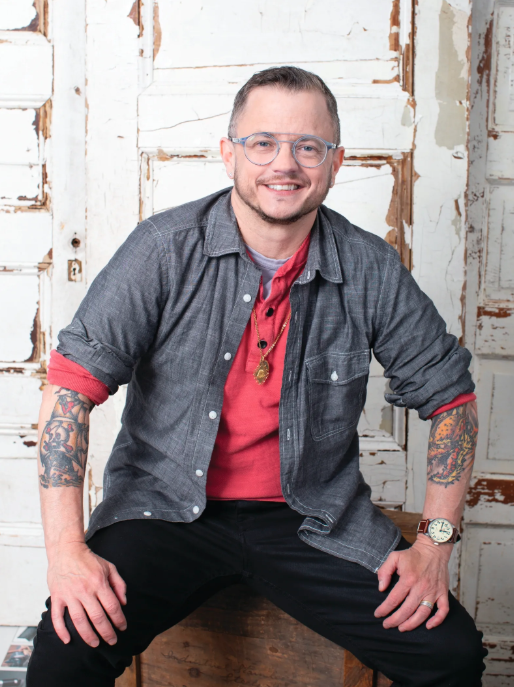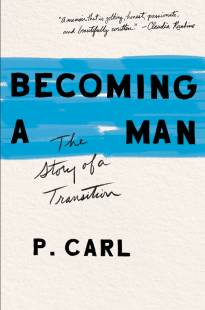P. Carl Tells His Story of Transitioning to a Man in New Book
Emerson College Artist-in-Residence P. Carl had never written a book, and wasn’t even working on Becoming A Man: A Story of a Transition, when a literary agent called asking him to write his memoir.

Unbeknownst to Carl, a friend had sent a few things he had written to the agent. The agent called and asked if Carl could write a book about his transitioning to a man, and said that she’d like to represent Carl.
“I wrote two chapters. We went to shop it around and in three days Simon & Schuster said they’d publish it,” said Carl.
Becoming A Man is being released on January 28, and a part of it is being published in The New York Times Magazine on January 26 (online January 22). The agent’s pursuit of Carl, Simon & Schuster’s jumping at the proposed book, and NYTM’s desire to publish excerpts, demonstrate a growing appetite for stories like Carl’s.
“There is not a ton of writing about the trans experience. There’s much less about transitioning to a man from people my age who had a life as one gender and then had an opportunity to see it in a different way,” said Carl, who is in his early 50s.
Carl said he has always felt like a man, and loved things associated with masculinity. At all-girl slumber parties, he wanted to play football, not Barbies. He has always been drawn to hanging out with the guys, to sitting back and drinking bourbon.
“There is a chapter about white masculinity and man talk. It’s really taking a deep dive of another angle at the issue of the way I grew up with white masculinity, and what it means to be a white male in the time of #MeToo and how it’s affected our culture and family life,” said Carl.

In the book, he also wrestles with what it means to be married to a lesbian as a man.
Carl was raised Polly in a small Indiana town. He attended the University of Notre Dame, a very Catholic and socially conservative college, where he dated men, including a boyfriend who eventually came out as gay. It wasn’t until Carl began his Ph.D. at the University of Minnesota, that he came out as a lesbian.
He would keep the name Polly for another two decades, until he began the process of transitioning to a man.
“When you’re 50 and transitioning, it’s weird to have a name that you never associated with in any way. I knew I wasn’t Paul. People called me Paul. I have two brothers and people often use their last name as their first name,” said Carl.
“I kept the P. for continuity… It actually closes down every computer system. It’s amazingly hard to get an airline ticket. They don’t recognize one-letter first names. Honestly, had I known it would cause so much trouble I might not have done it.”
Carl has worked the bulk of his career in the theater world. He is the founder of the online journal HowlRound, and the former co-artistic director of ArtsEmerson. As distinguished artist-in-residence at Emerson, he served as dramaturg for Claudia Rankine’s The White Card, which premiered at the Paramount in February 2018, and was co-produced and directed by the American Repertory Theater (ART).
Fittingly, the ART has already commissioned a stage adaptation of Becoming a Man, with Carl writing the script.
“My wife is in the play. My parents are in the play. The play is very much about family and transition. It’s a human story about love and friendship, too,” said Carl. “The ghost of Polly is the real issue in the book. Something you take up is how do you reckon with those memories of that person? What do you do with your wedding photos of five or 10 years ago?”
At 50, Carl has had a lifetime of being someone else. It’s different if someone transitions at the age of 8, 15, or 20. There is less history of yourself, fewer photos.
“Part of the situation is that you desperately want to leave that person behind. And in one way you can, and one way you can’t. [I’ve] been with [my wife] for 22 years, and 19 of those years I was someone else,” said Carl.
Carl said his transition was incredibly difficult for his wife, and that in some ways he didn’t expect that reaction because he figured she always knew he was a man. They would often talk about how Carl was not a woman.
“We had to come to terms whether we were married to ourselves or to a gender. It really raises that question. We’re still together,” he said.
Carl said he’s looking forward to seeing his book adapted into a stage performance. He wants a trans male actor to be cast as him, which could prove challenging. Despite more trans people entering the acting profession, there still aren’t many who are his age.
“I want to do everything to have the opportunity for a trans person to play a trans person on stage. There’s so little representation that it’s important,” said Carl.
Along with having his debut book released in January, Carl’s schedule is packed with a national book tour, and he’ll be an Anschutz Fellow at Princeton University this spring semester. He’ll be teaching one class, teaching a one-time seminar, and taking the time to write.
He does plan on returning to Emerson after his Princeton fellowship. As an artist-in-residence he has been teaching three classes during the school year, one in one semester, and two classes in the other semester. He also works as an advisor for Emerson’s Social Justice Center.
But his immediate focus is on the book.
“I really wanted the book to be something that anyone could read and find pieces of themselves in it, even if they have no understanding of trans,” said Carl.
He also wants to amplify what it’s like to live as a trans man.
“I feel people know so little about trans lives and the way we talk about them is sometimes less than a human or they’re ill in some way.”
He highlighted how black trans women are particularly being targeted and killed, and suicide rates are very high for trans men. He said one way to humanize groups that are being dehumanized is to see yourself in the same struggles.
“I wanted to create something that helps clear space for what’s coming. All of my students are thinking about gender, many are identifying as trans or nonbinary,” said Carl. “This is the future.” As I say in the book, ‘I’m writing this to be helpful.’”
Categories